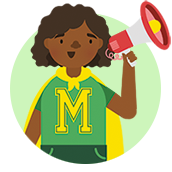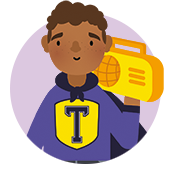Meet the IMPACTS Team Tūtakina te Rōpū Rangahau Hautoa Rōpū
The IMPACTS Team are a group of young superheroes, just like you. They are prepared in case an emergency comes that involves you, your whānau and your whole community. Kids like you can and do make a difference.
So, join the IMPACTS Team — and be prepared for whatever comes your way.
Impact 1: Stuck at home
 In most emergencies, it's best to stay in your own home if it is safe to do so. But that may mean being without power and water or any way to get supplies for three days or more.
In most emergencies, it's best to stay in your own home if it is safe to do so. But that may mean being without power and water or any way to get supplies for three days or more.
What actions should you take?
Do you have enough food and water? What about for pets too?
Light up
Your emergency supplies don't have to be in a kit, but you might have to find them in the dark. Make sure you know where the torches and batteries are.
Fridge first
If the power goes out, eat the food from your fridge first. Then your freezer. Then eat the food in the cupboard or your emergency kit.
Know your neighbours
Do your parents or guardians know your neighbours? In an emergency they may need your help or you may need their help. You may be able to band together to get through.
Impact 2: Can’t get home
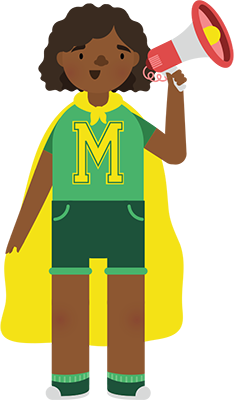 In an emergency, trains and buses may not operate, roads may close and streets or neighbourhoods might be blocked off.
In an emergency, trains and buses may not operate, roads may close and streets or neighbourhoods might be blocked off.
If you can’t go home your usual way, how will you get there? Who will pick you up? Where will you meet up if your street is a no-go zone?
Second meeting place
Talk to your parent or guardian about another meeting place if you can’t get home. It might be your school, a friend’s place or with whānau.
Know your numbers
Get your parent or guardian to give your school a list of three people who can pick you up if they can’t get there.
Pack a grab bag
Have a grab bag with walking shoes, warm clothes, some snack food and a bottle of water. A torch, batteries and radio are useful too.
Know your numbers
Have a list of numbers so you know how to contact your family and emergency services.
Impact 3: Have to evacuate
 In an emergency, some houses, streets and neighbourhoods may not be safe to stay in. You may have to leave home in a hurry.
In an emergency, some houses, streets and neighbourhoods may not be safe to stay in. You may have to leave home in a hurry.
What actions should you take?
If your street was evacuated where would you go? What would you take? What about pets? Do you have neighbours who might need your help?
Pack a grab bag
Talk to your parent or guardian about having a grab bag ready for everyone in your family. It should have warm clothes, a bottle of water, snacks, a face covering or mask, copies of important documents and photo ID.
Decide where to go
Ask your parent or guardian if there is a place you will go if you have to evacuate. Your evacuation place will probably be with friends or family, so they should know your plans too.
Check your zone
If you live in a tsunami evacuation zone, make sure your evacuation place is outside of the zone.
Impact 4: No power
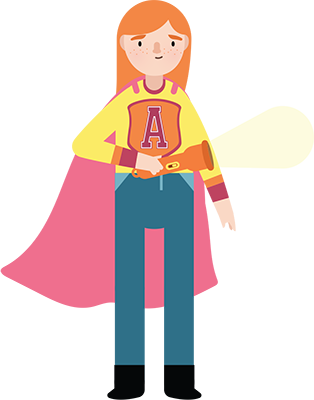 In an emergency, there may be no power, so you might have to find things in the dark.
In an emergency, there may be no power, so you might have to find things in the dark.
What action should you take?
What would you do if the power was out for days? How will you see, cook, keep warm?
Light up
Make sure you know where your torches and batteries are. They might not be in an emergency kit, but you might need to find them in the dark.
Stock up
Ask your parent or guardian if you have a stock of food that doesn’t need to be cooked or something to cook your food on that doesn’t use power.
Fridge first
If the power goes out, eat the food from your fridge first. Then your freezer. Then eat the food in the cupboard or your emergency kit.
Impact 5: No water
 Water cuts could affect your daily life. Make sure you have enough bottled water at home to see you through three days or more.
Water cuts could affect your daily life. Make sure you have enough bottled water at home to see you through three days or more.
What actions should you take?
Imagine having no water for three days or more. How would you wash, cook, clean? What would you drink?
Bottling water
Keep your empty water and fizzy drink bottles. Give them a good clean and fill them with water. You will need at least three litres of water for each person for each day that you are without water. Don’t forget to store water for pets too.
Stay fed and washed
Remember to store water for cooking and cleaning as well. Your parent or guardian can use the water in your hot water cylinder, but store some extra in large plastic containers too.
Impact 6: No phone or internet
 In most emergencies, it’s best to stay in your own home. Make your home your meeting place and have an alternative in case you can’t get there.
In most emergencies, it’s best to stay in your own home. Make your home your meeting place and have an alternative in case you can’t get there.
What actions should you take?
If the phone and internet lines were down, how would you keep in touch or arrange to meet up?
Plan a meeting point
Talk to your parent or guardian about how you will get in touch and where you will meet up if phone or internet lines are down.
Know the school emergency plans
Make sure your parent or guardian knows your school's emergency plans and has given your school the names of three people who could pick you up.
Stay tuned in
Have a solar- or battery-powered radio so you can tune in to the latest news for information during an emergency.
Out-of-town contact
Ask your parent or guardian if you have an out-of-town contact. Sometimes when local phone lines are down you can still reach people outside your area. You might be able to check in with your out-of-town contact by text or online messaging in an emergency.
Keep a list
Keep a written list of important phone numbers.
Impact 7: Damage to your home
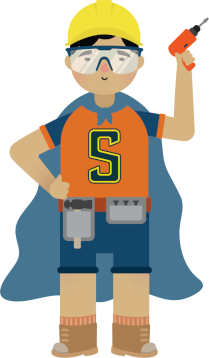 In an earthquake, most people are hurt from collapsing walls and roofs, and falling glass and objects.
In an earthquake, most people are hurt from collapsing walls and roofs, and falling glass and objects.
What actions should you take?
Is your home ready for an earthquake? Are there things that can be fixed or fastened? What can you do to make your home safe?
Give your home a check-up
Help your whānau to check around your home for items that could topple or shift in an earthquake or other natural disaster. Look for tall and heavy furniture, brick and concrete chimneys, unsecured hot water cylinders and appliances, and valuables that might break or move.
Get supplies
Your parent or caregiver will need brackets and other fasteners to secure bigger items, but even something as simple as blu-tack will help you secure smaller valuables.
Fix and Fasten
It doesn’t take that long to fix and fasten items that could become dangerous, but it will help keep you and your whānau safer in a quake. Ask your parent or caregiver about securing heavy objects both inside and outside your home.

Visit the Natural Hazards Commission Toka Tū Ake website for more information on making your home safer.
Get your school ready for an emergency
Schools play a large role in keeping the community safe. Learn about your school's responsibilities and teach students the skills they need to be prepared.


